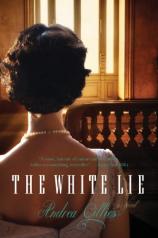Reading Group Guide
Discussion Questions
The White Lie

Have you ever regretted a moment—just a split second—one that alters life forever? What would you do if you had the opportunity to live nearly the same moment again?
Andrea Gillies’s spectacular debut novel tells the story of the Salter family, a family haunted by a history of personal tragedies. The narrator begins with a powerful declaration: “My name is Michael Salter, and I am dead.” What follows is a thirty-year roller coaster ride of turmoil, frustration, and neglect in an upperclass Scottish family that prides itself on handling affairs on its own.
Is there a curse? (Water, water everywhere,) What have members of the family done to deserve such a history of pain and suffering? (And all the boards did shrink;) Will the truth continue to haunt them? (Water, water, everywhere,) Or will the truth set them free? (Nor any drop to drink.)
Questions
1. According to the Oxford Dictionary, a white lie is “a harmless or trivial lie, especially one told to avoid hurting someone’s feelings.”
- a. Is telling a white lie acceptable under any circumstances?
- b. Is helping another person by telling a white lie acceptable when the intent has a negative impact on others?
- c. What are the white lies in this novel?
- d. Are the white lies in the Salter family acceptable? Explain.
2. From the first line of the novel, Gillies established a strong first person narrator: “My name is Michael Salter, and I am dead; dead, that much I know for sure” (1). Michael, however, experiences “cinematic visitations” that provide him with a more omniscient view. What do you think of the author’s technique to provide the reader with more views through a first person narrator? How does this unique approach spark the plot’s development?
3. Do you believe keeping the family secret is plausible? Michael addresses the reader on this topic: “What, you think it’s an unusual situation, a family manslaughter and then silence: the ease of doing nothing, the temptations of doing nothing, leading to nothing being done? It’s a lot more common than you think.” Is the narrator correct? Discuss events and situations where doing nothing was the main action? How is doing nothing similar to a white lie?
4. The butterfly effect is “the phenomenon whereby a minute localized change in a complex system can have large effects elsewhere.” Everything that is said and done influences us all whether directly or indirectly. What words and deeds by members of the Salter family have created this effect? Michael mentions Mog helping her great-grandmother with the teapot instead of heading out to find Michael like she had intended. If she had not been waylaid by this event, how might things have been different? How have mere moments of indecision or distraction created such an effect in your life? What other examples of these “mere moments” do you find in the novel? What is the author saying about fate and chance?
5. Ursula asks Edith, “How far do you think the suffering goes?” (89). each character in this novel suffers because of the tragedy.
- a. Which character suffers the most? Why?
- b. Which characters suffers the least? Why?
- c. Which character deserves to suffer? Why?
6. “And I’ve realised something about people who read. People who read: it’s not quietness. It’s not passivity. They’re having conversations with the writer, with the characters, are part living in that other situation. It’s like a judgment on everyone they know, that they go there, into the quiet world looking for friendship” (97).
- a. How is Michael’s position in the novel similar to the reader of a novel?
- b. Do you agree with Mog’s assessment about people who read? Explain.
7. The subject of death and all it encompasses pervades literature. As readers we bring our own unique perspective about death. Ursula says that “dying means ending, and people don’t end” (110). Do you agree with Ursula?
-
a. Michael adds his twist after listening to Ursula. “Consciousness is everything that remains of me here, and I’m confident this isn’t heaven. If we can agree that death is what makes us human: the knowledge of it, the life that we live unaware of anticipating it – and I think that we must – then it follows that I continue to be human, because even now I’m afraid that it’s coming” (110).
- i. How is Michael’s perspective unique?
- ii. What does this scene tell us about death?
- iii. What does this scene foreshadow?
8. Soren Kierkegaard said, “Life can only be understood backwards; but it must be lived forwards.” In her memoir called Keeper, Gillies quotes Jung: “Only the paradox comes anywhere near to comprehending the fullness of life.” Throughout the novel, Gillies provides many paradoxes about life. Explain each of the following:
- a. “He was a mistake but it was also serendipity.”
- b. “...human contact can be so profoundly inadequate, but at other times it’s inexpressively moving.”
- c. “Who’s responsible when nobody’s responsible?”
9. The local newspaper prints a picture of Glen of Peattie with a caption: “an outstanding relic from a vanished social order.” Does the Salter handling of its tragedies match the meaning in this caption? Does the family assume too much in handling its own affairs? Explain.
10. Michael’s great aunt Tilly talks to Michael about growing older. “You think age is about losing your youth, about loss; people make that mistake. The truth of it is different. It’s about constant additions, adding on. The child is still there, intact beneath them all, down at the heart of me; still here” (206). Do you agree with Aunt Tilly? What does aging mean to you?
11. James Hurst said in “The Scarlet Ibis” that “pride is a wonderful, terrible thing, a seed that bears two vines.” How does Salter pride hurt the family? How does Salter pride help the family?
12. Was it right of Ottilie, Michael’s mother, to withhold the name of his father? Explain.
13. How does each character endure the consequences of the white lie? Henry? Edith? Ursula? Ottilie? Alan? Euan? They all blame themselves, but is being sorry enough to compensate for any wrong? Explain.
14. How do the lines from the poem that Johnnie reads to Euan match Euan’s past plans and his plans about life? “The unseen line, the unseen door, the happy blindness of the day; processing sightless the imagined road” (334).
15. “They lie all day, sometimes in unusual ways. Just by doing things they lie, sometimes. Life depends on lies. It runs on them” (389). Which characters have lied? How often do people lie in your life? Where are lies prevalent in our society? Do you find lies, especially white lies, in your family? Explain. Alan and Euan, both outsiders to the family, create two of the biggest white lies. Do you think Alan and Euan’s intentions were selfish or do you think they truly wanted to spare the family? Explain.
16. Characters in this novel told lies to create hope or to avoid hurting someone. Have you ever told a lie to create hope or to avoid hurting someone? Explain the situation. Did the person discover your lie? If yes, was the person hurt or understanding? Explain.
17. Why is the reference to the Rime of the Ancient Mariner the perfect allusion? How is Alan like the mariner? How does the family suffer like the mariner? When does the curse for the family, like the mariner, end?
18. Gillies is a master at what memory is and is not. In her first book called Keeper, a memoir about caring for a family member with Alzheimer’s disease, Gillies ultimately states how loss of memory is loss of life. Gillies again displays her mastery of memory and its effects on people in The White Lie. “Memories are all we ever have, after even a day in the world, and who’s to make a judgment on what’s real and what’s not” (446).
- a. Whose memories do you believe? Michael’s? Alan’s? Ursula’s? Why?
- b. Is a memory reliable? Can you trust your memory? Michael says, “It’s reassuring when history doesn’t present variations; it feels as if memory is confirming itself as the facts, achieving a kind of objectivity.” Do you agree with Michael?
- c. In Keeper, Gillies uses a quotation from Oscar Wilde: “One’s real life is so often the life that one does not lead.” Applying this quotation to the novel, are Michael’s memories pertaining to his “wife and children” any less real?
- d. What would life be like for you if you lost some or all of your memories? Explain.
19. Is Ursula guilty of the “same” action twice? Is the family guilty more than once? Explain.
20. Does the ending surprise you? Why or why not? Why is Michael able to rest?








